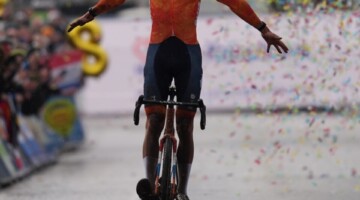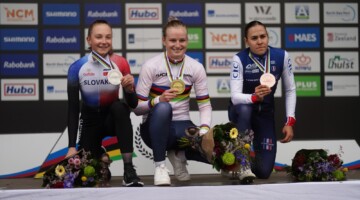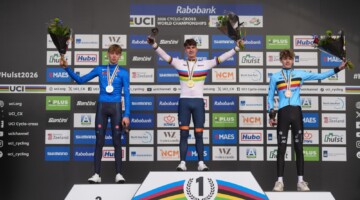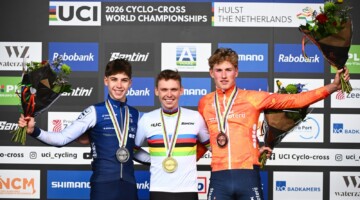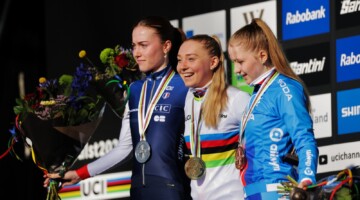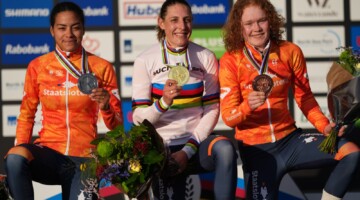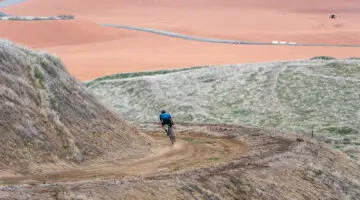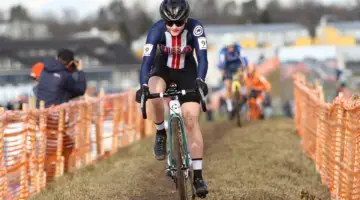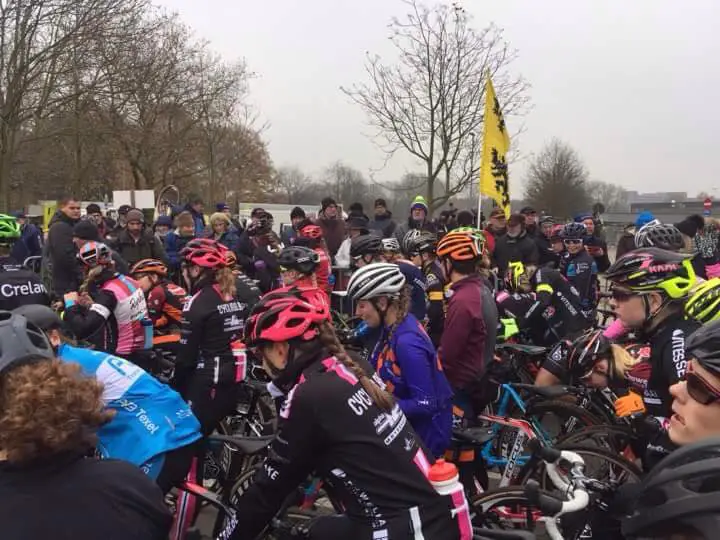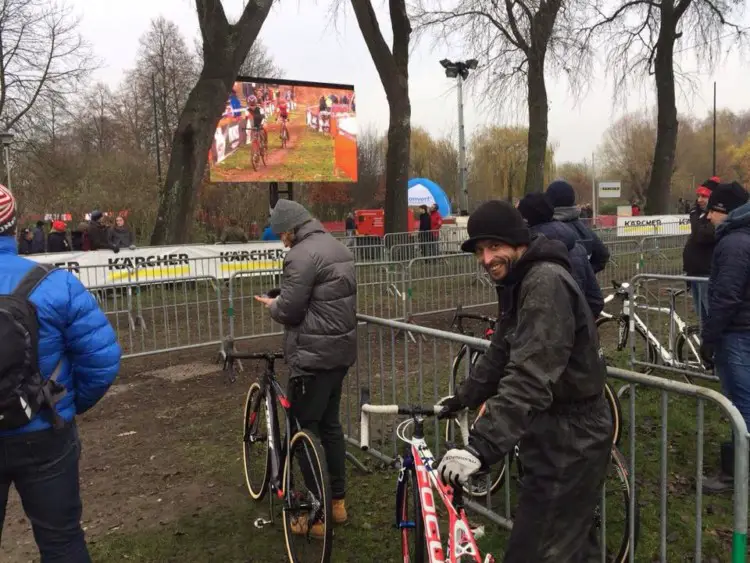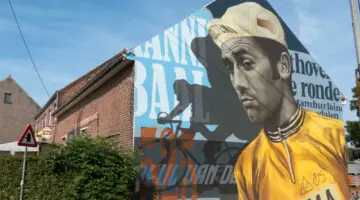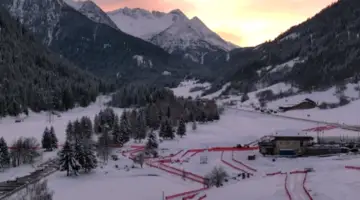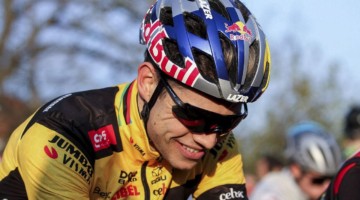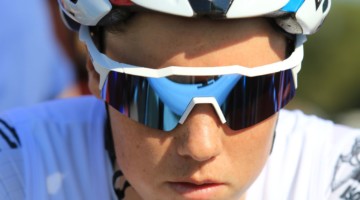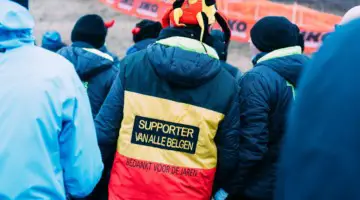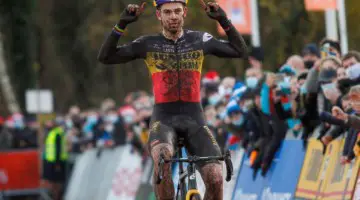Corey Coogan Cisek of Minnesota is living and racing in Belgium this winter. She will be providing regular diaries documenting her experiences of handing the Belgian winter, racing against the best and putting her year of Dutch studies to good use.
by Corey Coogan Cisek
Thanks to Cyclocross Magazine for the opportunity to share my adventures as an American cyclocross racer living in Belgium.
First, a bit about who I am … and who I am not. I am not a professional rider, nor do I have hopes of becoming one. I’ve had some success at U.S. Cyclocross Nationals, finishing second in the singlespeed race at Hartford and winning my age group twice in prior years, but I have just a handful of UCI points to my name. There are so many athletes over here chasing the dream of becoming one of the world’s best.
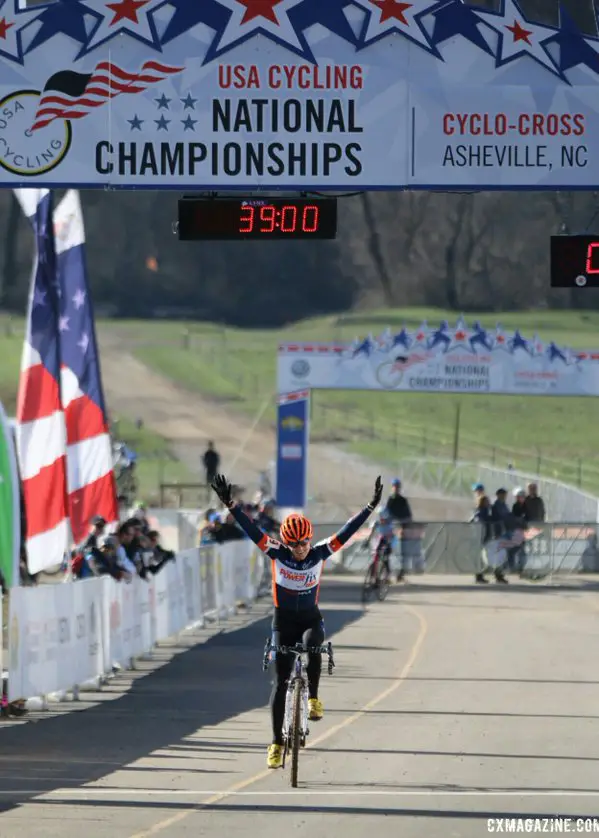
Corey Coogan Cisek won Masters Women 35-39 title in Asheville. 2016 Cyclocross National Championships. © Cyclocross Magazine
I admire them, but I’m not one of them. For me, being here is living the dream.
In my “real life,” I am a wife, a project manager, and a “mom” to Black Labrador named Green. However, for the next three months, I am living in Aarsele, Belgium, training and competing with the world’s best.
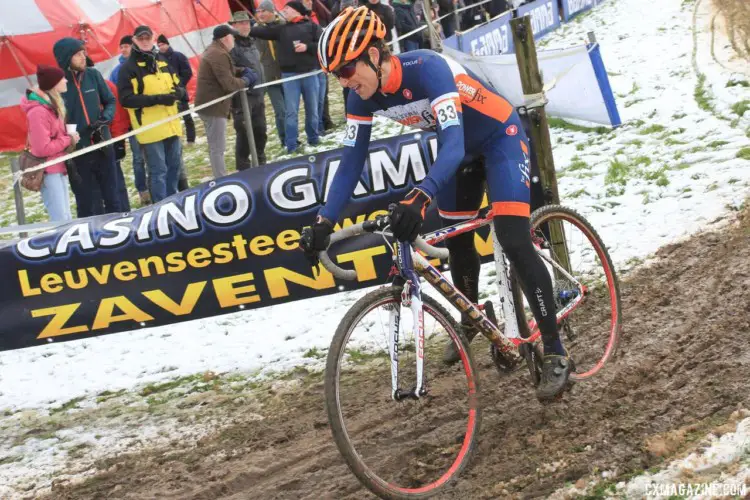
Corey Coogan Cisek of Minnesota is doing a block of Euro racing. 2017 Vlaamse Druivencross. © B. Hazen / Cyclocross Magazine
A Cyclocross Apprenticeship
Why? The best, most genuine answer I have is for the love of cyclocross. During last year’s Namur commentary, Helen Wyman said, “Cyclocross is an apprenticeship.”
This is my apprenticeship.
Some ways down the road, I would like to coach or direct a team. Our challenge, given that our sport is still about 75% European at the UCI level, is to develop riders who can handle the stresses of living and racing abroad. I’m hoping this immersion in Belgian cyclocross provides knowledge I can pass along.
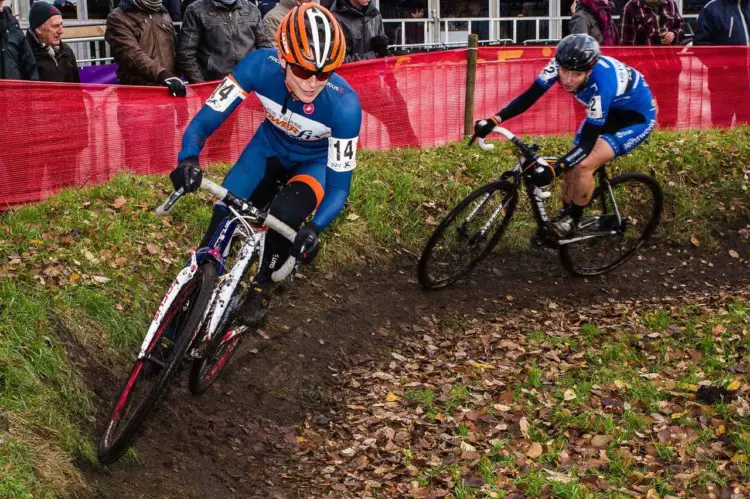
Corey Coogan Cisek is doing a cyclocross apprenticeship in Europe this fall/winter. photo: Kurt Van Hout
Since I’m not a pro, this trip took two years of focused saving. I am lucky in that I am able to take both vacation time and unpaid leave from my job. This trip is also possible because of friends’ kindness. In the past, I’ve taken short competition trips to Belgium, and while doing so, I became good friends with my mechanics. They’ve made this trip possible by helping me to find affordable housing, loaning me a trainer and wheels and supporting me at the races.
“It’s Different”
I arrived just after Thanksgiving, so I’ve had two weeks to get acclimated.
To sum it up, “It’s different.” Every … little … thing is different.
In the U.S., we talk a lot about Europe’s challenging courses and competition. Both are very challenging, but I think we underestimate the difficulty of adapting to life in a new country.
I’m from Minnesota, where our state championships were in the negative teens several years ago. That said, winter in Belgium is bone-chilling, worse-than-you-can-imagine, cold. With energy being more expensive here, houses are often kept colder than in America. Clothing dryers are also less common.
Yet, in two short weeks, I have learned some lessons. It does take a major force of will to leave one’s cozy bed in the dark Belgian morning. I take a deep breath, throw the covers off, dress in haste and rush downstairs to where it is warm. (Common spaces are kept warm. Bedrooms are not.) Sport clothes will hang dry overnight, but cottons and cycling shoes can be dried on the heaters without burning the house down.

Even the Christmas trees are … different in Belgium. photo: courtesy
In the beginning, everything takes longer. Going to the grocery store (boodschappen doen) is my biggest time suck. I took two semesters of Dutch to prepare for this.
The biggest benefit of my Dutch lessons is I always know what type of animal I am eating! That, however, is the only thing I am assured of in the grocery store.
Between trying to be frugal and also to eat healthily, a trip to the grocery store requires lots of label translation and sleuthing. Have there been mistakes? Let’s just say I have been eating some sort of sweet and sour sauce on my pasta for the last couple of days.
The Payoff: The Races
Oh, but the races, they are everything you can imagine.
First of all, they have a smell. Midwesterners will understand when I say a cyclocross race in Belgium smells like the county fair: fried.
Imagine the smell of frites, beer, mud and manure, cigarette smoke and general wetness, and you have the idea. Besides the course-side “discotheek,” there is also the occasional small band with tubas roaming about.
Unlike courses in the U.S. where nothing gives me pause, most courses here have something that scares me. In Essen, there was a manmade run-up and ride down that was actually a two-story pile of dirt. (Belgian course prep 101: if you don’t have a natural feature, build one.) Descending it felt something like taking that first step off a high dive. In Overijse, the twisty, slush and mud-covered descents required shutting off my brain and letting the bike drive itself.
I have the utmost respect for the mechanics in Belgium. Is there anything worse for a bike than riding it in conditions like Overijse?
I don’t pretend to know all the tricks of a mechanic’s trade. I can only say that I preride two laps and then hand my mechanics a muddy and clogged-up bike. Then after a lot of cold spray, brushes and lube, they return a bike to me that is cleaner than I can ever get it.
As a “thank you,” I go back out, preride two more laps and trash my bike again, so they clean it yet again before I race. For me, it is money well spent. With frequent cleanings, there’s less damage to the bike. For them, it’s a labor of love, because, honestly, there is no way I can pay them enough for the work that they do.
As all the Masters learned in Mol, there can be a lot of sand running in Belgium. Timewise, Zilvermeercross in Mol was probably 75% running for me. For this, I was “lucky” to have fractured my ulna in August. Because I couldn’t ride outside, I did a lot of running and that running has been getting me through!
If I have any regrets as far as my preparation, it is the amount of time I spent pedaling a bike. While no doubt someone like Sanne Cant has tremendous watts, in Belgium, on-and-off the bike finesse and handling is paramount.
On tap for next week is the DVV Scheldecross in Antwerpen on Saturday, a small race in Ronse on Sunday and then Kerstperiode!
Coogan Cisek will be providing regular diaries during the next two months while she is living and racing in Belgium.

